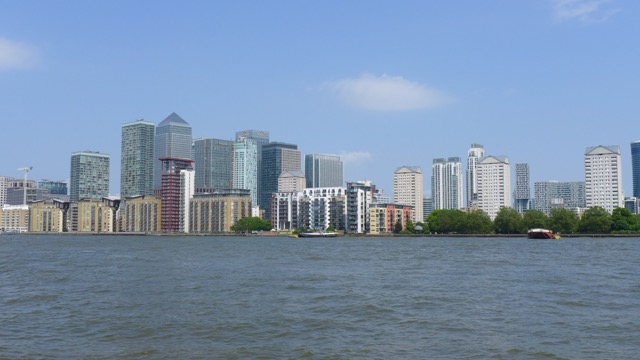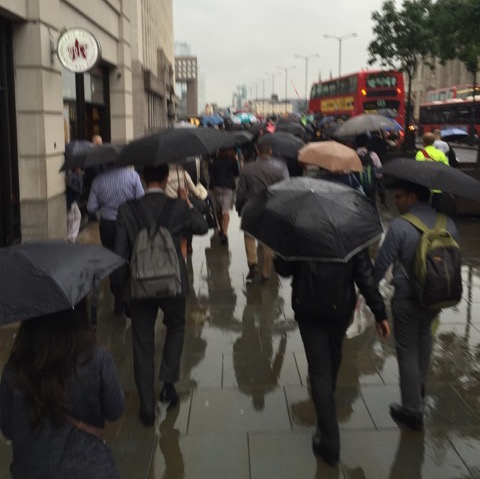This is a story about speaking to the audience...

Acknowledging the reader is not a great literary device, when overused. I think I have pushed most people away, by writing with a very lecturing tone. When I address my readers as "you" I normally have somebody in mind. I tend to be using this blog as a passive-aggressive device, to attack those who have wronged or offended me.
When I write about "get a job" idiots, it's because I'm highly offended, when I've had a 20 year career and been in full time education or employment since age 4. When my hackles are raised because somebody says "everybody has to work" it's because I've probably put up with more shitty boring jobs than most people, and racked up more hours. Investment Banking is not known as a career for slackers. IT projects always demand you to pull some epic hours to get things over the line.
When I write about the hypocrisy of my parents, it's because they epitomise everything I would never want to become: lazy, underachieving, highly critical and negative people, who have always put their own selfish wants ahead of their children's needs. When I look at the general decline in living standards of the younger generation, it triggers my deep sense of having had an enjoyable time as a child and young adult robbed from me. And for what? So I can now have a miserable boring job?
There's a Frank Zappa quote that I like, though:
If you end up with a boring miserable life because you listened to your mom, your dad, your teacher, your priest, or some guy on television telling you how to do your shit, then you deserve it
But, in the words of my Dad: "you've got to pay to play". Of course, he forgets that his Dad was a wealthy accountant who very much paid for him to play.
So, I'm working a job that I hate, because I needed money and I needed it fast. Here in London I can get an IT contract very quickly and easily, and earn 5 or 6 times more than the average wage. You might think it's ungrateful, spoilt, to take this for granted and to even be unhappy, but after 20 years of playing the same game, using the same tried-and-trusted formula, there is no novelty, no surprises.
When I was 20 years old, I was earning £400/day working for Lloyds TSB in Canary Wharf. I was doing exactly the same work that I do today. It might seem vulgar to talk about money, but maybe you need to know why I'm not exactly thrilled to get out of bed in the morning.
There's a high-water mark: an expectation, set by your experiences. I really don't live any kind of jet-set life. I shop in regular supermarkets, I rarely eat out, I drink wine that costs less than £10 a bottle. I don't pay for satellite television, luxury gym membership or in any way indulge expensive tastes. Even my suit is threadbare and worn out, and I wear cheap shoes.
Some people need the status symbols, the trappings of wealth. Sure, I could plough my income into having a Ferrari, a speedboat, but you're missing the point: I completely rejected the rat race, made myself destitute, and I loved it. The feeling of liberation from monthly downpayments on some material object, or mortgage payments on bricks & mortar, brought joy back to my soul.
The highlight of my week was talking to the guy who shone my shoes. Under the grand arches of Leadenhall Market, by the futuristic Lloyds building in the City, this chap told me that he had quit his job as an auditor for Ernst & Young, and had become an actor. Sure, he was poor - having to shine shoes for £5 a pop - but you could see he was clearly in love with his life again.

You might see pictures of my fancy apartment, with its river views and think "flash bastard" and "that must cost a pretty penny". However, you have simply been fooled by the image that I wish to project... in fact, I need to project. I get paid a lot of money because I'm successfully hiding the fact that I'm a desperate man on the ragged limit of control. Only the semicolon tattoo behind my ear slightly gives away the fact that I'm living a life of quiet desperation.
In actual fact, the rent on my apartment comes to roughly double what it cost me to live in a hostel. Instead of living in a 14-bed dormitory with people who are on the very bottom rung of society, and having to share a bathroom and protect my few possessions from theft and spoil, instead I have an ample sized ensuite bedroom, storage cupboard and expansive reception rooms in which to relax in comfort.
You would think that living in a hostel would be cheap, so paying twice as much does not sound unreasonable, correct? When you consider that I can safely keep my bicycle in my hallway, I have a central London parking space, and amazing views over the River Thames from my balcony, you must surely recognise the value for money that I'm getting.
My one threadbare suit I only use for interviews, and the rest of the time I wear £50 trousers from John Lewis, no jacket and no tie. Somebody complemented me on my sharp attire the other day, and asked if my clothes had been tailored to fit me. I could only chuckle to myself, knowing that my outfit is entirely cheap off the peg stuff.
My accountant must despair of me, as I always cut things mighty fine. There is no profligacy - every penny I spend is calculated, right down to the few bits of bling that are necessary to indicate that you have attained a certain social status. It's just going to look a bit weird if you're an IT professional with a cheap shit laptop.

The really frustrating thing is how easy it is to fool people. Everybody assumes that under the surface, everything is just fine. If you dress yourself up in the right clothes and pretend like everything is tickety-boo, people have no reason to suspect that you are one negative event away from killing yourself.
I have no idea how I'm going to sustain the charade. Just because you're settled into your little rut, and figured out a system to keep turning the pedals, doesn't mean that I can do it. Smile and take the money, right? But what if it's too easy? What if the formula has been so perfected, that life is a paint-by-numbers?
I tried to teach a friend how to blag and hustle. I tried to show him the magic formula. I busted my balls to transfer as much knowledge as possible about how to play the game. He's no fool, and knew a few of the tricks of the trade already. However, ultimately he let himself down, because of the subtle detail.
There must be something that sets people apart. What is it that shatters the illusion? It could be something as simple as not noticing that your suit has still got the slit in the back of the jacket held together by a stitch of thread that you are supposed to cut yourself. It could be as simple as a cheap pen, or umbrella. It could be a single moment of self-doubt, or an answer to a question that clearly betrays the fact you're blagging, because you fail to one-up the interviewer and blind them with things they don't understand.
It might sound like snobbery, but it's actually the very essence of how people get into positions of authority. Having a shirt monogrammed with your initials, wearing an expensive wristwatch, carrying a Moleskine notebook, writing with a Mont Blanc pen, wearing the correct style suit and shirt and shoes. It's all so shallow, but sadly it works.
I'm part of a boys club, and there's no way I can show my hand. There's no way that my colleagues would be able to process the fact that I'm barely coping with mental health problems, the threat of relapse into drug addiction, and a desire to return to a simpler life when I didn't have to grind just to pay taxes, rent and maintain a fake image of having my shit together.
If I address the audience, it's because I'm so lonely in the little stage-play of my daily life. From Monday to Friday, I'm putting on a poker face, and looking busy at my desk. I face the threat of being found out as a blagger, a hustler, at any moment. The homeless guy is not welcome in the club. There's no room for anybody with a weakness, in the corporate dog-eat-dog world.

My colleagues tell me I'm doing a good job, and they like working with me, but I feel like a fraud when I submit my invoice for the week, and I think about how much time I spent on Facebook, writing blog posts, tweeting, reading the news and hiding in the toilet. I look at my timesheet, and it doesn't reconcile with the amount of work I have actually done. Sure, I was present in the office. My bum was on the seat for the hours I declare, but I don't feel productive or even useful.
So, I cast out into the world, looking for a connection, desperate for somebody to acknowledge my existence. Even when I rub somebody up the wrong way, at least it means some of what I say is hitting home somewhere. Most of the time, I'm alone with my thoughts and lonely as hell.
Every time I address "you" it seems to fall on deaf ears. I quickly forget that people have reached out, gotten in contact, because the conversation is so sporadic, unpredictable. This is such an unusual mechanism of communication, but what would I do without it? Friends have literally threatened to unfriend me on Facebook, because of the disproportionate amount of space I have consumed on 'their' wall.
I'm rambling, but I don't want this to end. It feels like I'm talking to "you". It feels like "you're" listening. It feels like I have a human connection, an honest relationship, that I just don't get for all those lonely, lonely office hours, where my whole focus is on trying to hide my depression, anxiety, boredom and desperate lack of purpose.
Without this blog, I'd be stuffed. There's a temptation to adapt my writing to be more appealing again. There's a desire to drive up the number of readers, by writing things that I know will be like clickbait, and nice to read.
However, that's not my style, not my purpose. We're having an intimate conversation, you & I. You might not realise it, but I'm thinking about hundreds of different potential audience members, as I write... trying to engage you... trying to connect.
Even if this isn't being read by the people I intended, at least it's there. There's something comforting, knowing that a little piece of me has been captured somewhere, in my own words. It feels like I'm at least winning, in the battle to leave a true account of who I was, and not become a convenient dumping ground for those who seek to abstain from any blame, for the part they did, or did not play in somebody's life.
I live in London. I'm practically an expert in turning a blind eye: ignoring the Big Issue seller, the clipboard-wielding survey taker, the collection tin rattling charity worker, the beggar, the pavement evangelist, and every other undesirable member of society who has fallen on hard times. I know what it's like to have your head down because you're so wrapped up in your own struggle, and so fixated on the rat race.
I've considered the question many times: am I a melodramatic attention seeker? Are my cries for help completely unnecessary? Is my lot in life no worse than anybody else's?
Frankly, who gives a shit? I'm just about scraping through every day by the skin of my teeth. Not only walking out on a boring job, but potentially leaving this shitty life altogether. I know how decisive I am. I know how bold and brave I can be, once I have decided to do something. I know I could easily snuff out my life, in the blink of an eye.
Doth I protest too much? Why take the chance?
Isn't this somebody else's problem? Aren't there pills for this?
Yes, try clinging onto those pathetic get-out-of-jail-free cards, once the person has gone.
Perhaps I'm dredging up emotions that could be suppressed? Perhaps the very act of writing is prodding at raw nerves, and actually keeping feelings on the surface that could easily sink back into my subconscious. Am I, in the very act of writing this blog, talking myself into depression and suicide? Well, the journal charts my moods, so you have all the data you need for the postmortem.
I live for writing. I live for my browsing stats and my Twitter followers. I live for those few moments when somebody emails out of the blue, and acknowledges my existence. You would be surprised how few and far between those precious events are.
Moan, moan, moan, right? Poor me, poor me, pour me another drink?

Perhaps Alcoholics Anonymous is the place for this, even though I'm not an alcoholic? Dylan Thomas wrote that an alcoholic is somebody who drinks just as much as you, but you don't like them very much.
Why do we push people to the fringes, the periphery? Why do we want the people who wail in distress to just shut up and go away? Do you think it completely meaningless, when somebody goes to great effort to explain how they're feeling, and attempt to communicate with you, by whatever means they can?
How long have I been doing this for? Shut up! Give up! Go away! Right?
If something doesn't immediately work, just quit, right?
Hasn't the message been received from you, loud and clear? You don't care. You're busy with your own life.
Is it the bystander effect? Surely somebody else is going to do something? Not me, I'm not going to be first. I don't want to get involved!
What do you think's going to happen? Are you going to catch my mental illness? Are you going to be made responsible for my life? Are you going to be shackled to me, forced to live with me, with me stealing food from your children's mouths? Am I out to ruin you and your family?
I feel like a dirty leper. I feel contagious. I feel a huge amount of pressure to pretend like I'm capable of just conforming, complying... when the truth is that things are getting worse, not better. My patience is worn thin. My energy levels have been exhausted. I'm later and later getting to work. I can no longer even pretend to be busy, and keep up the charade.
Join a gym. Eat some kale. Go to a book club. Get a girlfriend.
Can I chase away the existential dread with trivial frivolities, when the bulk of my waking hours are filled with such utter bullshit? Having a taste of freedom has perhaps ruined me. Knowing how the game is rigged, and how to play the system has left me reeling, with the shocking revelation of the pointlessness of it all.
Even if - for the sake of argument - I'm a dimwitted fool, it still doesn't take away the fact that my brain is in overdrive. I'm bombarded with thoughts in the empty hours where I am so unchallenged, so bored.
You educate a person. You train them for a job. You stretch them and challenge them and titillate their interests, and then what? You put them into a corporate machine where independent thought is undesirable? You put them into a bland business environment where creativity is discouraged? You put them into the straightjacket of the working world, where innovation and ingenuity are unnecessary?
Yes, I'm compliant, because I had a tax bill to pay, and debts to pay down. But every day is a simple test of patience. What's going to win: am I going to commit suicide, run away from my pointless responsibilities, or simply sit mute in my chair trying not to scream for long enough that I have built up another nest egg to fritter away on more life-affirming pursuits?
Life's too fucking short for all this. The clock ticks down to the day I die, and what can I say I did with my life? I didn't tell the boss to go fuck himself? I didn't storm out of the office, yelling at the top of my voice that everyone is wasting their precious existence on pushing paper around their desk? I didn't let the bank, the landlord, repossess their precious property and go live somewhere off-grid, to get away from the constant pressure to run just to stand still.
I'm writing and writing, because there is no end until going home time. How do I fill these empty hours where I'm 'working'. Does anybody even care that I've churned out tens of thousands of words, at the expense of the companies I'm contracted to work for? Does anybody even notice, that it makes not a jot of difference, whether I'm fulfilling my job description or not?
You're going to look at the length of this essay and think "what the actual fuck, who has the time for this?". I could put a cork in my mouth. I could curtail this bout of verbal diarrhoea. But what else would I do with my time? At least this wall of words - this tidal wave - records for posterity, the angst that might drive me to my early grave. At least people can see the kind of torture that my soul was subjected to.
Suffer in silence? Fuck off.
Tags: #writing #socialmedia #suicide #depression #mentalhealth

